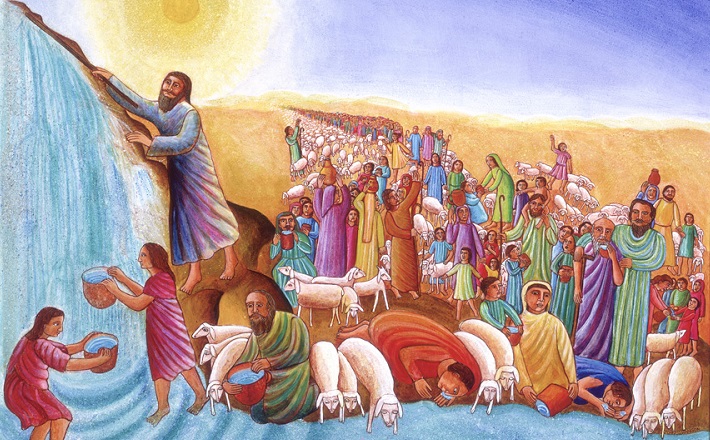Commentary on Romans [3:28-30] 5:1-11
This passage begins with the strong words, “therefore, having been justified/made righteous” (the same Greek work is translated in English as either justified or made righteous).
In the original language, the beginning is even more dramatic since in Greek grammar the word ‘therefore’ cannot start a sentence: the first word is, then, “dikaiothente” (having been made righteous). It sounds like a great victorious shout — ‘having been justified’. The grammar of “dikaiothentes” indicates that Paul is describing a state of being, the condition of his hearers’ lives. The word is an aorist participle in the passive voice: this is a state of affairs that has happened to the hearers.
Paul now goes on to describe the dynamic, challenging and productive life that those who are in the state of having been made righteous may live. It is very clear that Paul does not think that having been justified is the end of the story but the beginning. It is a beginning that offers entrance into a radically different way of living.
The apostle clarifies that the state of being made righteous is possible by means of faith. This is what he has stressed in the previous chapter: justification has always come by means of faith, Abraham being the prime exemplar of this. In line with Abraham, believers in Christ are those whose identity is solely rooted in having been made righteous by faith. This is our fundamental defining shape.
Paul then describes in other words the wonder and consequence of our having been justified by faith. It means that we have peace with God through our Lord Jesus Christ (Romans 5:2). We are no longer enemies of God, which was the case when Christ died for us (5:10). The enmity we had towards God when we were not righteous (when we were sinners, 5:8) is dissolved once we are “dikaothentes.” This is so because we are no longer in Sin’s army, waging war against God’s righteousness through our acts of sin. Rather, having been made righteous by faith, we are, as Paul says later, slaves of God (6:22). This has all happened through our Lord Jesus Christ who is himself the conduit and sign and gift of God’s love.
Christ’s death for us is a demonstration of God’s love for us (Romans 5:8). Christ’s death/God’s love accomplished our liberation from being slaves of God’s enemy Sin into the marvelous liberty of having peace with God. The almost inconceivable fact is that God made God’s love visible to those who were at war with him. Rather than defeating or punishing his enemies (the slaves of sin), God liberated us. Christ died for those who were against God — the ungodly (5:6). This act of God is so astonishing that Paul must ponder it out loud: it is possible to imagine someone dying for a good person, but it can only be an act of divine love that would die for sinners.
The astonishing and astounding love of God accomplished our reconciliation to God. Reconciliation is a parallel concept to being justified. The state of being made righteous is the state of being liberated from God’s enemy, sin and having peace with God.
Life in the reconciled, liberated, having been justified state is one which is lived through the love of God. The love of God accomplished our new way of being and the love of God enables it to flourish.
The remarkable claims about our new ‘having been justified’ life which Paul makes in Romans 5:1-5 are based on the love of God. God’s love, poured into our hearts, is what enables us to live the life of being justified. The Holy Spirit which God gives to us makes real for us God’s love and our responsive love for God (5:5).
God’s love as Paul understands it is not a fluffy, cheery amorphous sort of thing. God’s love — being demonstrated in the death of God’s Son who gave himself for us; God’s love which reached out to those who hated God — God’s love is structured by action and self-sacrifice. This quality of love is what fills the hearts of those who are made righteous.
Consequently, while we hope to share in God’s glory, we the justified are ready to suffer as God in Christ does. Just as suffering was intrinsic to God’s reconciling love, so it is to those who have been reconciled. And so, Paul claims that the justified are those who rejoice in our sufferings (Romans 5:3). We know that our sufferings are productive of endurance, character and hope (5:3-4).
God’s love created a new way of existence — a ‘having been justified’ and reconciled with God way of existence. And God’s love allows those living this new existence to embrace it fully, suffering and all.
The mystery of God’s love can never be fully known or experienced, but Paul’s thoughts in this passage give us substantial material for our meditations and prayers on its wonders.
PRAYER OF THE DAY
Gracious God, you have welcomed all people into your kingdom. Remove from us the barriers that we build to keep people from you, so that all might live in your grace and peace. We pray these things in the name of Jesus Christ, our Savior and Lord. Amen.
HYMNS
Let us talents and tongues employ ELW 674
O living breath of God ELW 407
CHORAL
The Spirit also helpeth us, J. S. Bach


May 26, 2019